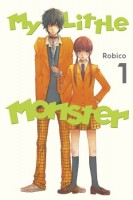My News and Reviews
Last week, I was rather preoccupied with my move. The rest of the family and I are now successfully living in the new house, but we aren’t through with moving and there’s still plenty left to do. However, amidst all of the chaos, I was able to post this month’s manga giveaway and there’s still time to enter for a chance to win a copy of Paradise Residence, Volume 1 by Kosuke Fujishima. (The winner will be announced on Wednesday.) Although I wasn’t online much at all last week, there were still a few things that I heard about. Digital Manga announced a new imprint, PeCChi, which will focus on ecchi manga of various types, starting with The Secret Devil-chan by Emu as well as Me and the Impish Devil by Hideaki Yoshikawa. Digital Manga’s most recent Kickstarter project will be released under the Pecchi imprint if it succeeds—Kaworu Watashiya’s controversial Kodomo no Jikan which was previously licensed by Seven Seas but never published. And, completely unrelated, the third part of “The Sparkling World of Shojo Manga,” which focuses on Riyoko Ikeda and The Rose of Versailles Manga, was recently posted at The Lobster Dance.
Quick Takes
 Fairy Girls, Volume 1 by Boku. Hiro Mashima’s Fairy Tail has inspired a fair number of spinoff manga and adaptations, several of which have been released in English relatively recently. Fairy Girls, featuring four of the most popular female characters from the Fairy Tail guild—Erza, Juvia, Lucy, and Wendy—is one such spinoff. The series takes place immediately following the Grand Magic Games arc in the original series, but for the most part doesn’t actually require the reader to know much at all about Fairy Tail to follow along. Actually, those who are familiar with Fairy Tail and love these characters might end up more frustrated than not with Boku’s version. Fairy Girls almost reads like an unfunny parody, but I don’t think that was at all the intention. I wanted to like the manga much more than I actually did seeing as the basic premise had such promise. Many of the women in Fairy Tail are great characters, but in Fairy Girls they come across as extremely shallow versions of their true selves. The fanservice in Fairy Girls is somewhat odd, too. Without going back to check the entire volume page-by-page, I believe Boku has managed to completely avoid any panty shots (almost conspicuously so) but the manga does frequently seem to be fairly boob-focused.
Fairy Girls, Volume 1 by Boku. Hiro Mashima’s Fairy Tail has inspired a fair number of spinoff manga and adaptations, several of which have been released in English relatively recently. Fairy Girls, featuring four of the most popular female characters from the Fairy Tail guild—Erza, Juvia, Lucy, and Wendy—is one such spinoff. The series takes place immediately following the Grand Magic Games arc in the original series, but for the most part doesn’t actually require the reader to know much at all about Fairy Tail to follow along. Actually, those who are familiar with Fairy Tail and love these characters might end up more frustrated than not with Boku’s version. Fairy Girls almost reads like an unfunny parody, but I don’t think that was at all the intention. I wanted to like the manga much more than I actually did seeing as the basic premise had such promise. Many of the women in Fairy Tail are great characters, but in Fairy Girls they come across as extremely shallow versions of their true selves. The fanservice in Fairy Girls is somewhat odd, too. Without going back to check the entire volume page-by-page, I believe Boku has managed to completely avoid any panty shots (almost conspicuously so) but the manga does frequently seem to be fairly boob-focused.
 LDK, Volume 2 by Ayu Watanabe. I know a few people who really enjoy LDK and so I want to like it, too, but at this point in the series I find it to be more infuriating than anything else. Maybe the manga gets better as it goes along, but I can’t say that I’m particularly interested in finding out since there is very little about the first two volumes that I actually enjoyed. Probably my biggest issue with LDK is that the series’ leading man, Shusei, shows absolutely no respect for Aoi, the series’ heroine, despite supposedly having feelings for her. The second volume of LDK introduces a romantic rival who, likewise, doesn’t actually seem to care about Aoi’s feelings. And I still remain unconvinced that any of the people involved legitimately love or even like any of the others. I believe LDK is intended to be a romantic comedy, but it just doesn’t seem to work as one for me, probably because the characters have failed to win me over. Even though some of the scenarios and situations in LDK are admittedly ridiculous and over-the-top (though not especially original), for whatever reason the humor just isn’t very funny as a whole and the balance between it and the manga’s more serious aspects is off.
LDK, Volume 2 by Ayu Watanabe. I know a few people who really enjoy LDK and so I want to like it, too, but at this point in the series I find it to be more infuriating than anything else. Maybe the manga gets better as it goes along, but I can’t say that I’m particularly interested in finding out since there is very little about the first two volumes that I actually enjoyed. Probably my biggest issue with LDK is that the series’ leading man, Shusei, shows absolutely no respect for Aoi, the series’ heroine, despite supposedly having feelings for her. The second volume of LDK introduces a romantic rival who, likewise, doesn’t actually seem to care about Aoi’s feelings. And I still remain unconvinced that any of the people involved legitimately love or even like any of the others. I believe LDK is intended to be a romantic comedy, but it just doesn’t seem to work as one for me, probably because the characters have failed to win me over. Even though some of the scenarios and situations in LDK are admittedly ridiculous and over-the-top (though not especially original), for whatever reason the humor just isn’t very funny as a whole and the balance between it and the manga’s more serious aspects is off.
 Tramps Like Us, Volumes 6-9 by Yayoi Ogawa. As the series progresses, the basic premise of Tramps Like Us doesn’t really become any easier to explain without making it sound stranger than it is. Takeshi Gouda is a brilliant dancer trained in classical ballet who is trying to break into modern dance, but he is also Momo, the pet of Sumire Iwaya, a successful journalist who is under a lot of stress in both her love life and career. Their relationship is a very complicated and curious one but it’s very important to them both, which is why it’s concerning for them when it begins to change and they slowly begin to realize that their feelings for each other are less platonic and more romantic. Occasionally Tramps Like Us does feel a little directionless in these particular volumes, as though Ogawa is starting to lose narrative focus or trying to stretch the series longer than it necessarily needs to be. Some of the more stand-alone chapters, while still enjoyable, tend to come across as filler or bonus manga rather than being crucial to the story proper. Even so, I love the characters of Tramps Like Us (Sumire, Iwaya, and all the others) so am glad to be able to spend as much time as I can with them. I am enjoying Tramps Like Us immensely and look forward to reading the final third of the series.
Tramps Like Us, Volumes 6-9 by Yayoi Ogawa. As the series progresses, the basic premise of Tramps Like Us doesn’t really become any easier to explain without making it sound stranger than it is. Takeshi Gouda is a brilliant dancer trained in classical ballet who is trying to break into modern dance, but he is also Momo, the pet of Sumire Iwaya, a successful journalist who is under a lot of stress in both her love life and career. Their relationship is a very complicated and curious one but it’s very important to them both, which is why it’s concerning for them when it begins to change and they slowly begin to realize that their feelings for each other are less platonic and more romantic. Occasionally Tramps Like Us does feel a little directionless in these particular volumes, as though Ogawa is starting to lose narrative focus or trying to stretch the series longer than it necessarily needs to be. Some of the more stand-alone chapters, while still enjoyable, tend to come across as filler or bonus manga rather than being crucial to the story proper. Even so, I love the characters of Tramps Like Us (Sumire, Iwaya, and all the others) so am glad to be able to spend as much time as I can with them. I am enjoying Tramps Like Us immensely and look forward to reading the final third of the series.





